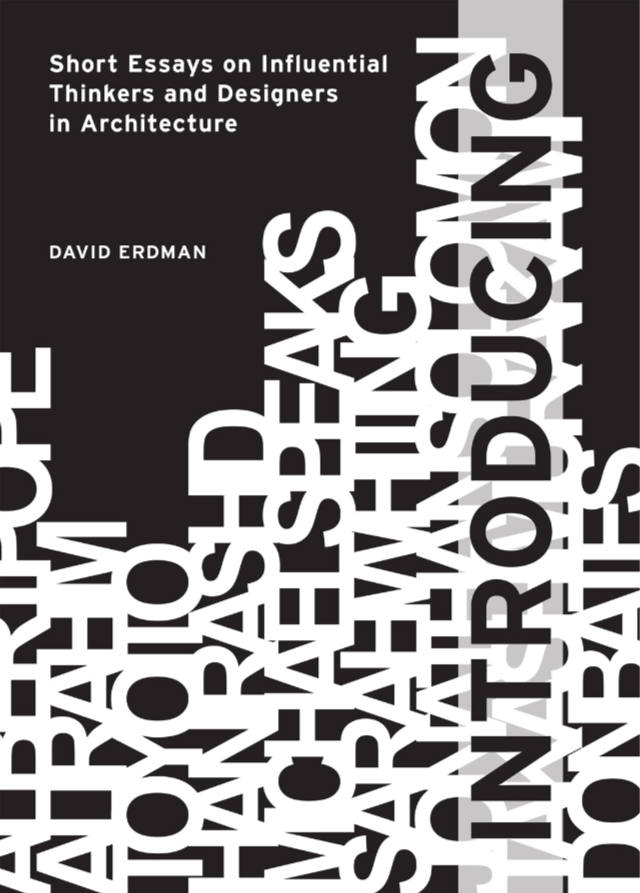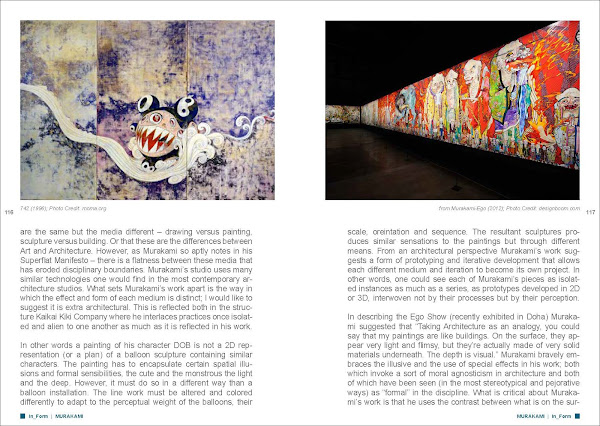Introducing
Introducing: Short Essays on Influential Thinkers and Designers in ArchitectureDavid Erdmanar+d (Applied Research + Design), February 2021Paperback | 6-1/2 x 9 inches | 203 pages | English | ISBN: 9781940743554 | $30.00PUBLISHER'S DESCRIPTION:In the post-Internet architectural climate, critical discourse historically found in the pages of institutionally backed journals has been overshadowed by a culture of abundant, shorter media. As traditional means of disseminating information has lost support, e-magazines, which are typically segregated from, if not entirely in opposition to, the academy and its requisite polemics, have risen in popularity. The question stands as to whether architectural discourse has the resilience to deal with the speed of new media, and if it does, in what form that discourse might be delivered and relevant.Introducing, Short Essays on Influential Thinkers and Designers in Architecture—a collection of 18 short essays developed by designer and educator David Erdman—suggests that short-form writing might serve as the proper vehicle for architectural discourse to flourish in the 21st century. Speculating that concise pieces of information attributed to the blogging and tweeting generation of architects is the contemporary format for the delivery of critical discourse, Erdman uses his essays to illustrate how an iterative approach to short-form writing might be the most efficient way for architecture to open new critical dialogues. Introducing further suggests that discourse is no longer (and will not be in the near future) delivered in extended, holistic polemical packages. Instead, Erdman posits that precise, undiluted snippets of discourse, which can be formed into broader strains of thinking by the user, or audience, simulate an “open source” information platform that is adept to the contemporary subject and architectural discipline, would be more suitable.David Erdman is Chair of the Department of Graduate Architecture & Urban Design at Pratt Institute’s School of Architecture, and he is a Rome Prize Fellow. He co-founded davidclovers in 2007, where he oversaw and designed over 20 completed projects in Hong Kong and elsewhere prior to repatriating in 2016. He earlier had co-founded servo in 1999, where he oversaw and designed projects in Los Angeles until 2006.REFERRAL LINKS: dDAB COMMENTARY:One thing the pandemic has done over the last fifteen months is push normally in-person events into the digital realm, with lectures previously limited to the capacity of an architecture-school auditorium opened up to hundreds more people via Zoom and other platforms. Although this situation has allowed me to watch a few such lectures, I'm usually too tired after a day's work to sit in front of a screen and watch them live. So I'll do it the next day, often skipping the introductory remarks that are full of the usual CV stats on the speaker: teaching positions, awards, publications, etc. If David Erdman's lecture introductions gathered in this appropriately titled book are any indication, maybe I should give them a chance; perhaps others have embraced his approach of giving ambitious intros that go well beyond the norm.Although the book's subtitle describes its contents as "short essays on influential thinkers and designers in architecture," most of them originated as introductions that Erdman gave before lectures at the Department of Architecture at the University of Hong Kong in 2012 and 2013, when he organized three lecture series across three semesters. Erdman, who now chairs Graduate Architecture & Urban Design programs at Pratt, took the opportunity to "use the lecture series as a platform to introduce ideas — to truly curate each grouping of lectures as a series," as he explains in the introduction. What followed were "On_Speed" in spring 2012, "In_Form" in fall 2012, and "Project_Ing" in spring 2013. His lecture introductions were integral parts of that "platform to introduce ideas," eventually taking on the form of carefully structured essays, as evidenced in the first spread (below).Introducing consists of eighteen introductions from those three semesters of lectures, noticeably fewer than the thirty people who actually lectured. While this means we don't get to read Erdman's takes on Wang Shu and Steven Holl, for instance, the list of introductions from the first full semester and partial second and third semesters is nevertheless impressive, a testament to the organization of the three series. Some standouts from the On_Speed series include Jonathan Solomon and Albert Pope, both of whom are responsible for important books: Solomon co-wrote the impressive Cities Without Ground, a visually rich guidebook to Hong Kong's network of elevated walkways; and Pope's Ladders is understandably one of the most influential and desirable books on urbanism produced in the last three decades. While Wolf D. Prix appears in the first semester, he would have been better in the next, In_Form, alongsi

David Erdman
ar+d (Applied Research + Design), February 2021
Paperback | 6-1/2 x 9 inches | 203 pages | English | ISBN: 9781940743554 | $30.00
PUBLISHER'S DESCRIPTION:
REFERRAL LINKS:
SPREADS:








